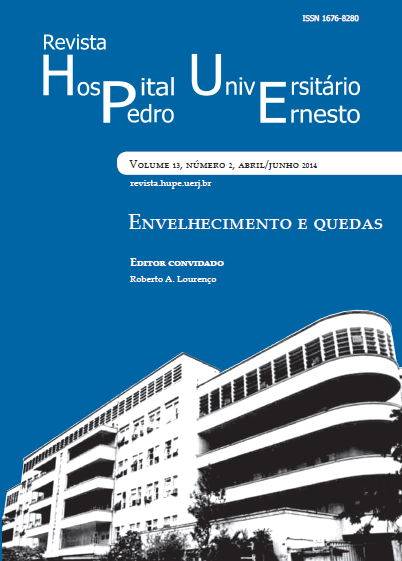Medo de cair em idosos e modelos de intervenção psicoterápica
DOI:
https://doi.org/10.12957/rhupe.2014.10121Resumo
O objetivo do presente estudo é fazer uma revisão bibliográfica dos modelos de intervenção psicoterápica utilizados em idosos que apresentam “medo de cair”. A pesquisa bibliográfica foi realizada na base do MEDLINE, LILACS e SciELO e foram acessados dez estudos com diferentes desenhos e intervenções, dos quais dois eram artigos de revisão sobre o medo de cair em idosos. Dentre os oito artigos que apresentaram modelos de intervenção, sete foram pautados na terapia cognitivo-comportamental (TCC) e um não deixou clara a linha de condução, sendo que os estudos que apresentaram melhor resultado na prática clínica foram os de intervenção multidisciplinar. Os dois estudos encontrados se valeram da intervenção da Fisioterapia e da Psicologia para avaliação e tratamentodo medo de cair em idosos. Apesar de se apresentar como uma questão de saúde pública existe uma escassez de trabalhos sobre modelos para intervenção e recuperação dos possíveis impactos psíquicos que influenciam a rotina de idosos com esse medo. O principal achado deste trabalho foi a caracterização do medo de cair como uma fobia, logo ligada a um transtorno de ansiedade, o que ajuda a nortear o tratamento, prognóstico e plano deação dos profissionais envolvidos. Conclui-se que a revisão de modelos existentes para o medo de cair precisa ser expandida em âmbito mundial e que se devam pautar as pesquisas sobre os modelos com os melhores resultados. Esse amadurecimento e a estruturação no campo do conhecimento do psíquico dos idosos podem vir através de uma maior participação dos psicólogos em pesquisas, adaptações e ensaios de modelos para o medo de cair, assim como para outros quadros específicos e para a avaliação inicial, com a população idosa.
Descritores: Psicoterapia; Medo; Idoso; Acidentes por quedas.
Revista HUPE, Rio de Janeiro, 2014;13(2):62-68
doi: 10.12957/rhupe.2014.10121


